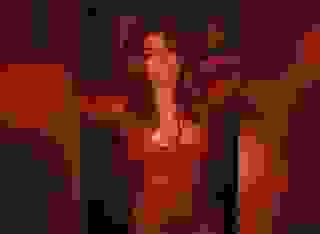Note: You can change font size, font face, and turn on dark mode by clicking the "A" icon tab in the Story Info Box.
You can temporarily switch back to a Classic Literotica® experience during our ongoing public Beta testing. Please consider leaving feedback on issues you experience or suggest improvements.
Click hereThe column of horsemen advanced slowly toward the houses. Salamon and Althea were near the back. Twenty yards from the wall, they stopped and dismounted. Swords were unsheathed. Cautiously they walked up to the narrow gate. It was open. The deserted street beyond was also narrow, but wound among the buildings so that vision was limited. They proceeded almost in single file. After they had passed several houses and the street had already taken several turns, the soldiers ahead stopped. Salamon and Althea could hear shouts and then sounds of fighting. Suddenly doors of the houses on the street opened and armed men appeared on either side of them. They had been ambushed.
Salamon and soldiers at the end of the column pushed ahead as they could. Salamon stabbed one attacker, who fell to the ground, and he drove another off. The soldiers were better armed and experienced; the attackers were mere townspeople. Althea backed against the wall and tried to keep moving forward without drawing attention to herself. She stepped over the body of a man curled up clutching his stomach. He had dropped a short sword. Althea picked it up and continued.
Soon they turned the last corner and could see the bridge. Several of the horsemen had already crossed. The fighting was disorganized with pairs of combatants here and there. Wounded men lay about or staggered away from the conflict. Salamon was engaged with a swordsman. His back was to Althea when she noticed another attacker approaching him from behind. For the moment she was between them. The man's eyes were focused on Salamon's back and he seemed oblivious to her presence. She waited until he was nearly beside her and then stepped from the shadow and thrust her weapon into his abdomen. He simply looked at her with surprise. Althea let go of the weapon and stepped back. Salamon had dispatched his opponent and turned just in time to see hers collapse to the ground. Grasping Althea's wrist with one hand and the horse's bridle with the other, he led them quickly over the bridge.
There he caught the reins of a horse that had lost its rider. Salamon mounted Althea upon it, assumed his own saddle, and led her away from the town and the road along the river. Soon they were alone with a safe distance behind them. He stopped and she understood they would camp here for the night, just the two of them. Salamon tended to the horses, while Althea gathered wood. Only then did they pause to rest.
"I owe you a thanks. And you deserve this back." He handed Althea a dagger. She took it and recognized it as her father's. She was pleased that Salamon placed his trust in her and wondered that she had slain one of her own countrymen to defend him. "This looks like a good place to wash some of the dust away. You might want to do the same." Althea looked down and saw that her cloak was smeared with blood.
As Salamon began to remove his clothes, she went discretely downstream to do the same. She scrubbed her cloak and dress on the rocks and spread them on the bank. Then, unclothed, she slipped into the water. It was delightfully cool in the waning sunlight. She felt herself relaxing for the first time in weeks -- since her father died. Funny, she had scarcely thought of him since she had been captured. Then her thoughts turned back to Salamon. He had become her protector, the only piece of stability in a world that had fallen apart. How could he stay so strong? What did he think of her?
When she emerged from the water, Salamon was sitting naked beside her clothing watching her. She dropped any pretense of modesty and knelt in front of him. "My Lord, I am at your command."
His smile vanished. "I will not command you." He rose and returned to the camp. Althea quickly dressed and joined him at the fire, where he had divided the little remaining food. They ate in uncomfortable silence. There had been a blanket on her horse, so they were able to lay down on opposite sides of the fire. He fell asleep quickly, as he always did.
She lay awake for a long time, pondering the events of the day. Why did I defend him? How did I offend him?
They arose the next morning, saddled the horses and set out at a leisurely pace. Althea was determined to break his silence. "Salamon, tell me about your wife."
He gave her a hostile look, then softened. "She was very beautiful, but not like you. She was more delicate. Her father was a miller and she didn't have to work in the fields. I fell in love with her when I was a lad and eventually persuaded her father to allow her to marry me. We had two children - first a son and later a daughter. One day I was tending the fields when I heard a commotion in the village. I was far off. By the time I came home, raiders from your land had already come and gone. They burned the mill and plundered the houses. They raped her and cut her throat. My son tried to save her and they killed him, too, though he was only eight years old. My daughter hid and saw it all." His face became hard and his eyes looked into the distant hills.
"It was because of raids like these that I joined the war. I thought I wanted revenge. I was going to kill all the Swalians I could find; but when we pillaged the first town and I watched my countrymen raping and killing women and children, I understood that we were no better than your people. I wanted no part of it. I did my duty -- soldiers have to fight for one another or we all die -- but I took no satisfaction in it.
"When I saw my comrades attacking a defenseless band of women and children, I knew that if I saved one person, that would be the most I could do for my dead wife. That is when I stepped in and pulled you out of the massacre. I thought you were an old woman, until you uncovered your head. I had no intention of taking you with me; but I didn't know what to do with you. If I let you go, you would have died like the others." He fell silent a moment and turned back to her. "And then I didn't want to let you go."
He stopped his horse, and she saw they had come to a road. Salamon waved to the right, up the hill. That way is Endor. That is my home." He pointed to the left. "There is your home. You are free to go. I hope there is peace now."
They sat in silence for a while. Althea pointed to the right. "I have nowhere to go. That is my home now. Let me be your slave."
"If you will come, will you be a mother to my daughter?"
Althea started her horse, directing it up the hill. "Salamon. How do you treat your wives?"
He smiled. "As they deserve."
"Despite the violence, this is calmer than your other stories. It's my favorite one," Stephen commented. "I suspect there is more of you in this. I sense a yearning."
"It's true. I am damsel in need of a knight."
"You will have to tell me your other fantasies sometime. Or maybe not." He winked.
"And I am dying to know yours. Now I want to hear your story."
"This one begs for expansion, as well as for better writing, but see what you think of it. I call it "Rings."
"Wedding rings?"
"Of a sort, but not what you have in mind. Remember you said these stories have to have a kink in them."
"I can't wait."
Rings
Her earliest memories came to her as nightmares. Her parents were kneeling on the wooden deck praying as the ship tossed back and forth. Then she was in the water and the sea swept over her head. With time, her nightmares became memories of nightmares and then those, too, went away. The image that stayed with her the longest was the face of a very kind woman looking down on her. She had a wooden ring about her neck and Elena reached up to play with it. Her mother had taught her about angels and she wondered if this woman were an angel and the ring her halo. But when the woman spoke, Elena couldn't understand her words.
Her childhood in the orphanage was pleasant. All the Mothers were kind and a four-year-old makes friends easily, even if she doesn't keep them all. She learned the new language quickly and forgot her own tongue. Her foreign origins, however, stayed in her genes. As time went by she grew taller than the other girls, and her black hair and dark eyes contrasted with their fairer colors. She could run faster and soon became the best at most of their sports. As children can be, other girls were sometimes cruel and ostracized her for her strangeness, and Elena began to withdraw into herself and into her studies. The Mothers struggled to find a place for her. She no longer belonged with her girls of her own age. Since she was taller and learned quickly, they advanced her to the next cohort.
Her uniqueness was not merely a matter of her appearance. She had no social identity. She learned early on that the society was divided into four moieties. Two of them, the Wintom and the Jons were large. Political power generally alternated between them, Elena learned from the history books. The other two, the Smit and the Bran were small, but often played the tie-breakers in the political contests. One's membership came from one's mother, and marriage within the moiety was strictly forbidden. Every child quickly knew to which moiety he or she belonged. Even infants left at the door of the orphanage would have some token with them giving their identity. Not belonging to a moiety was unthinkable. Elena was unthinkable.
Now and then the children's routine was disrupted by outside visitors. These might be officials inspecting the orphanage; occasionally new Mothers arrived; but every now and then a childless couple came to look for a girl to adopt. Nearly all of the children had a secret wish that one of these families would choose them. As pleasant as life was made for them, the idea of belonging to a family took on a mythical proportion. Elena was not immune to this desire, but she understood it could never be her lot.
One day after class Elena approached Mother Agnes. Mother Agnes had long empathized with Elena's isolation and the two formed a special bond. She was the person Elena would seek out of there was a problem.
"Mother, I am bleeding."
"Show me Elena." Elena turned and lifted her cloak to reveal the red stains on her skirt. "So soon. Your classmates won't start their bleeding for another two years."
"What does it mean?"
"It means you are becoming a woman. We will have to put you in a different cohort."
"Why am I so early? Is it bad?"
Mother Agnes laughed. "No it is not bad. The truth is, we never knew how old you were when you were found. And you have grown so fast! You are full of surprises. I must tell Mother Witta so you can take part in the next Moonrite."
That very evening, Elena was moved to a different part of the orphanage with other girls who had had their first bleed. The Moonrite was a coming-of-age ceremony held at the full moon for those who just became women. It was a simple and beautiful ceremony. The initiates were instructed in the power of women to create life and the importance of cleansing and protecting themselves. They were given the girdles of womanhood and new dresses. From now on Elena's studies would change to focus on the skills of being a woman. She would now learn weaving and cooking, and skills of negotiation and conciliation.
Elena tried hard to fit in with her new classmates and companions. What she could not understand was their collective obsession with males. None of them had spent much time around men or boys of any age, for there was a separate orphanage for boys older than three; but men meant family and having children. Elena was put off by such talk. The ideas stirred deep anxieties within her that she didn't understand, and she withdrew into herself again when the subject came up.
Visitors generated an excitement for a different reason among this age group. No longer was there any talk or hope of adoption; but poor families who could not afford a normal bride price occasionally came looking for wives for their sons. A couple might appear off to the side with or without their son and accompanied by a Mother. They usually observed quietly for one or two visits. Then a Mother would summon one of the girls for an interview. If it was successful, she would be married off with much fanfare.
Elena's companions were not old enough for marriage, and it all seemed mysterious and irrelevant to her. There were two other possible destinies for the girls. Most would go to factories to earn a living. Periodically, a broker for the factories appeared and negotiated. He might take a dozen or more girls with him. There was much speculation about what happened to them. At least they had a chance to experience the outside world. The girls left behind knew nothing beyond the high walls of the orphanage and envied those who were able to leave.
The other path was to stay in the orphanage and become a Mother. Mothers had a variety of jobs, teaching, cooking, cleaning, making clothing, or any of the many tasks necessary to raise the children. This was Elena's dream. She had excelled in the classroom and wanted to become a teacher. However, she knew there were a limited number of such opportunities.
When she could, she would visit Mother Agnes and talk about her ambitions. She enjoyed helping her former teacher prepare lessons for the younger girls and enjoyed the older woman's attentions. But when she declared she wanted to grow up and be just like Mother Agnes, she was surprised not to receive encouragement. "Elena, you are a very special person. I don't know what fate the gods have in store for you, but it will not be usual. Keep your mind open, your eyes sharp, and don't stop learning. Something wonderful will come your way."
Elena pondered those words. How could she hope for something wonderful when she had no place in this society? Could her fate be to leave for another island? People told stories about other islands, but no one had ever visited them. Their small fishing boats could not possibly sail so far. Only Elena herself was proof that such stories were true.
One day Mother Witta, who was in charge of the older girls, summoned Elena to her office. "Elena, I have some very special news for you. A family has been inquiring about a wife for their son. They have seen you and are quite impressed. Would you like to meet them?"
Elena was stunned. "I don't want to get married. I want to become a teacher here."
Mother Witta spoke kindly, "Of course, this is the only place you have ever known. But there is much to be seen and learned outside these walls. There are joys of which you cannot even dream. Don't you want to be able to wear your own rings?"
Elena was overwhelmed and unable to make a decision.
"You take some time to think about it. I told them you might be too young yet and they understood. But they won't wait forever. We will talk some more."
Elena knew she was being dismissed, though questions were racing through her mind. She left the office in a daze.
Elena walked aimlessly about the yard lost in her thoughts. Then she heard someone weeping. she followed the sound to an open window. She climbed part way into a tree to see in. One of the older girls was sitting and crying. She had on a beautiful yellow dress.
"Why do I have to do this?" A low voice answered her, but Elena could not make it out. The girl whined again. "He is old. I don't like him. How will he treat me? I don't want to marry him. You're just selling me to make money." As she raised her voice, she also raised her hands in gesticulation and Elena saw a chain attached to each wrist. One of the Mothers put her arms around her to calm her down. This must be the girl she had heard about who was getting married tomorrow.
Elena slid down the tree and ran to a private corner where she often sat and thought. Do I want to get married? That girl was terrified and I need to know why.
The next day she went to Mother Witta's office.
"Elena, you've come back. Have you changed your mind?"
"I still don't know. Mother, are those rings from your marriage?" Married women were given a set of rings by their husbands. One encircled the neck and two more the wrists. Of all the Mothers at the orphanage, only Mother Witta wore rings of marriage. They were the subject of much speculation and giggling by the girls.
"Yes they are, but my husband is dead. Once you put rings on, they will not come off unless the marriage is broken."
"What is it like being married?"
"It's wonderful. It is what every girl dreams of."
"What do you do?"
"What a silly question. You have your own household. You husband works and brings home food and money. The woman prepares his meals and maintains the house. All the sorts of things you see Mothers do here."
"They do it all by themselves?"
"Of course. Until they have children old enough to help."
"How did your husband treat you?"
"How did he treat me? Very well. We built a home together. Unfortunately, we did not have children and when it became clear we were not going to have any he became unhappy. When he was drunk, he was sometimes mean, but he never hurt me very much. And then he got sick and died." Elena took this in in silence. "What shall I tell your prospective bridegroom?"
"I need to think some more."
"Don't take too long. You don't want to end up in a factory."
Elena was terrified. Life in the orphanage was easy enough, but doing all the work for one man was incomprehensible. If Mother Witta was thinking about sending her to a factory, her best option would be to run away. They locked the gates at night, so she would have to slip out during a meal when everyone would be busy. She determined to leave at breakfast the next day.
She had never been outside the orphanage since she arrived. It had been large enough for all of her needs until now. Once outside, she had no idea where to go, so she followed the road. It led into a wood where she walked for hours. As the morning grew late, she grew weary and sat on a fallen tree to rest. Not far away was an apple tree at the edge of a clearing. She stopped to eat.
Soon she heard voices. Two men appeared on the road, one carrying an axe. Perhaps they could direct her to the nearest town. She stood to approach them.
"What have we here?" one of the men cried. "A girl. With no rings."
"She's a pretty one. What do you think she'll fetch in the market?"
"I think we should find out."
With a shock, Elena realized they were talking about her. By the time she stood to flee, one of them had grabbed her arm. "Don't run off so fast. I bet you are hungry. Share our lunch with us." He unwrapped a loaf of bread and block of cheese and broke off portions for all three. She was grateful for the food. "What's your name, girl?"
With her mouth full of apple, she couldn't answer immediately. Then she decided it would be better to say nothing.
"Do you talk?" She tried to look uncomprehending. He spoke louder. "Are you deaf?" She steeled herself not to react. He turned to his companion. "Deaf or not, she's worth something."
The other man spoke up. "She's worth something to me right now." He took her left arm and made her get off the log, then he tried to push her down on the ground. She resisted and made a grab for the axe with her free arm. She swung it at him and he let go of her to dodge. The other man laughed. She dropped the axe and started running. She was taller than they and had always been a fast runner, so she was able to outdistance them long enough to hide in the woods. For a long time she heard them searching and calling, but eventually they left.
Now Elena was lost, uncertain where the road was or where it led. She had read about bad men in her children's stories, but she had never seen any before. For the first time she felt fear. She continued through the woods, slowly and cautiously on the lookout for signs of any other people.








